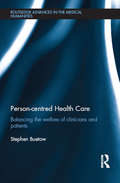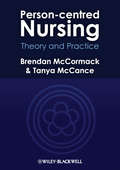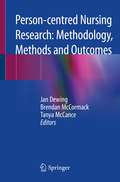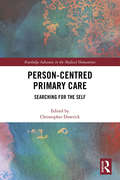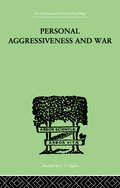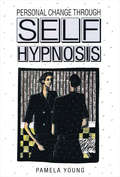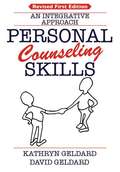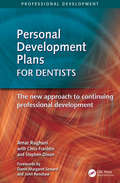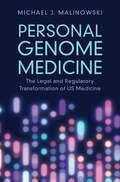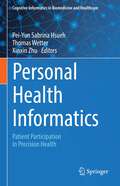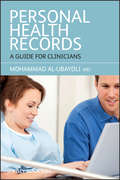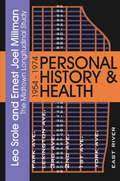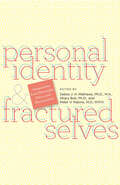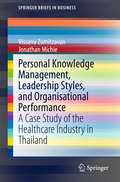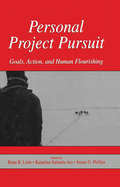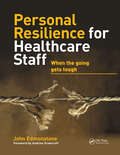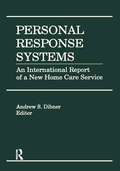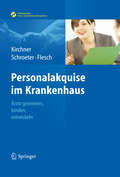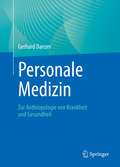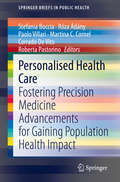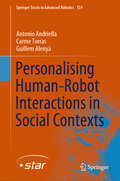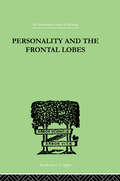- Table View
- List View
Person-centred Health Care: Balancing the Welfare of Clinicians and Patients (Routledge Advances in the Medical Humanities)
by Stephen BuetowPerson-centred health care is increasingly endorsed as a key element of high-quality care, yet, in practice, it often means patient-centred health care. This book scrutinizes the principle of primacy of patient welfare, which, although deeply embedded in health professionalism, is long overdue for critical analysis and debate. It appears incontestable because patients have greater immediate health needs than clinicians and the patient-clinician encounter is often recognized as a moral enterprise as well as a service contract. However, Buetow argues that the implication that clinician welfare is secondary can harm clinicians, patients and health system performance. Revaluing participants in health care as moral equals, this book advocates an ethic of virtue to respect the clinician as a whole person whose self-care and care from patients can benefit both parties, because their moral interests intertwine and warrant equal consideration. It then considers how to move from values including moral equality in health care to practice for people in their particular situations. Developing a genuinely inclusive concept of person-centred care – accepting clinicians as moral equals – it also facilitates the coalescence of patient-centred care and evidence-based health care. This reflective and provocative work develops a constructive alternative to the taken-for-granted principle of primacy of patient welfare. It is of interest to students and academics in the health and caring sciences, philosophy, ethics, medical humanities and health management.
Person-centred Nursing
by Brendan Mccormack Tanya MccanceThe concept of 'person-centredness' has become established in approaches to the delivery of healthcare, particularly with nursing, and is embedded in many international healthcare policy frameworks and strategic plans. This book explores person-centred nursing using a framework that has been derived from research and practice.Person-centred Nursing is a theoretically rigorous and practically applied text that aims to increase nurses' understanding of the principles and practices of person-centred nursing in a multiprofessional context. It advances new understandings of person-centred nursing concepts and theories through the presentation of an inductively derived and tested framework for person-centred nursing. In addition it explores a variety of strategies for developing person-centred nursing and presents case examples of the concept in action.This is a practical resource for all nurses who want to develop person-centred ways of working.
Person-centred Nursing Research: Methodology, Methods and Outcomes
by Jan Dewing Brendan McCormack Tanya McCanceThis book is the first ever to offer a contemporary collection of different perspectives on person-centredness in international doctoral nursing research. The research in the book is based on the ideas and values of personhood and person-centeredness, which have been used and can be seen to guide research approaches, inform research designs and theorize research findings. Further, a specific framework for person-centred nursing is embedded throughout the research studies presented in the text. The Person-centred Nursing Framework (PCNF) developed by Brendan McCormack and Tanya McCance in 2010, is recognized as a nursing theory and this book further develops it as a basis for research and for advancing person-centredness in nursing. The framework informs all stages of the research process, from design through to dissemination.The book is structured into a number of highly engaging chapters written by doctoral candidates, and recently graduated candidates. The opening and closing chapters, written by the editors, place the subsequent chapters in a global context of person-centredness and nursing. The potential for person-centred nursing research to be a global movement is recognized and debated. The subsequent chapters lead readers through philosophical ideas, methodologies and methods whilst also offering reflective and honest insights into learning how to become a person-centred researcher. This field is growing and developing but yet there is no specific book available. As a result, researchers spend considerable time and effort translating existing research methodologies into person-centred perspectives. This book fills this gap and acts as a key resource for future nurse researchers. The text is intended for, and benefits nursing doctoral candidates, masters candidates and academic staff who teach and supervise research candidates; it may also appeal to other graduate learners. The book has international contributions which makes it appealing internationally.
Person-centred Primary Care: Searching for the Self (Routledge Advances in the Medical Humanities)
by Christopher DowrickPrimary care, grounded in the provision of continuous comprehensive person-centred care, is of paramount importance in the delivery of accessible and effective health care around the world. The central notion of person-centred care, however, relies on often-unexamined concepts of self, or understandings of what it means to be a person and an agent. This cutting-edge book explores contemporary pressures on the sense of self for both patient and health professional within a consultation and argues that building new concepts of the self is essential if we are to reinvigorate the central tenets of person-centred primary care. Contemporary trends such as shared decision-making between health professionals and patients and promoting self-management assume those involved are able to make their own decisions and take action. In practice, however, medicine often opts for reductionist perspectives of patients as passive mechanical systems and diseases as puzzles. At the same time, huge political and organisational changes mean time and resources are scarce, putting further pressure on consultations. This book discusses how we can start to resolve these tensions. The first part considers problems posed by the increasing bureaucratisation of primary care, the impact of information technology in the consultation, the effects of chronic disease on our sense of self and how an emphasis on biology over biography leads to over-diagnosis. The second part proposes solutions based on a strong ontology of consciousness, concepts of creative capacity, coherence and engagement, and will show how these can enhance the self-esteem of patients and doctors and benefit their therapeutic dialogue. Combining theoretical perspectives from philosophy, sociology and healthcare research with insights drawn from clinical practice, this edited volume is suitable for those researching and studying primary healthcare, communication and relationships in healthcare and the medical humanities.
Personal Aggressiveness and War
by E F DurbinThis is Volume I of seven in the Social Psychology series. First published in 1949, from a symposium entitled 'War and Democracy' this essay presents an introduction to the scientific study of the causes of fighting and war. It offers an attempt to describe and analyse the general psychological forces lying behind the timeless and ubiquitous urge to fight and kill.
Personal Aggressiveness and War (The International Library of Psychology: Social Psychology #I)
by John Durbin E F M & BowlbyFirst Published in 1999. Routledge is an imprint of Taylor & Francis, an informa company.
Personal Change through Self-Hypnosis
by Pamela YoungGet help with:• Confidence and communication• Assertiveness• Smoking• Eating disorders• Study issues and exam nerves• Pregnancy and childbirth• Insomnia• Breast enlargement• Sporting enhancement• Anxiety, panic attacks• Job interviews• Fear of flying• Depression• Broken heart• Skin problems• Headaches• Nailbiting• Pain control• Drug and alcohol problems• Tumours• Seasickness• Anger Management
Personal Counseling Skills: An Integrative Approach
by Kathryn Geldard David GeldardThis book is a comprehensive, easy-to-read introduction to personal counseling written for professional and volunteer counselors and those who train them. It is also a valuable resource for workers in a wide variety of helping professions where counseling skills are useful such as in psychology, social work, welfare work, medicine, nursing, education, and human services.
Personal Development Plans for Dentists: The New Approach to Continuing Professional Development
by Stephen Dixon Rughani Amar Chris FranklinHealthcare has suffered from a series of scandals where trust and patient confidence has been questioned. This timely book examines recent case studies involving every aspect of healthcare provision including the Shipman and Alder Hey cases. It shows how positive lessons can be learnt from these experiences to improve health and healthcare. The contributors offer practical advice based on their extensive and broad experience on how to regain trust between patient and practitioner following these difficulties. They demonstrate how doctors and other healthcare professionals can introduce ways to reduce error and mistrust and describe how to work better with press the public and patients. It is essential reading for all healthcare professionals policy makers shapers and commentators and those representing patient groups. 'The context of this volume is clear - the Bristol paediatric cardiac surgery debacle the Alder Hey scandal around retention and use of dead children's organs without consent and the Harold Shipman murders largely of elderly women in their own homes by their own GP. No surprise then that a first analysis suggests a breakdown of trust. But what the various authors argue for in this volume is both a more careful commentary and a series of complex responses. Real change is gradual a response to a narrative rather than to a single shock to the system. Professional leadership cross-disciplinary working with patients and the public is what will rebuild trust trust based on honesty on listening and on a strong sense of shared values. But it is possible and desirable. The authors have hit on what is 'essentially the 'way through this'!' Julia Neuberger in the Foreword
Personal Genome Medicine: The Legal and Regulatory Transformation of US Medicine
by Michael J. MalinowskiIn the years following FDA approval of direct-to-consumer, genetic-health-risk testing, millions of people in the United States have sent their DNA to companies to receive personal genetic health risk information without physician or other learned medical professional involvement. In Personal Genome Medicine, Michael J. Malinowski examines the ethical, legal, and social implications of this development. Drawing from the past and present of medicine in the U.S., Malinowski applies law, policy, public and private sector practices, and governing norms to analyze the commercial personal genome sequencing and testing sectors and to assess their impact on the future of U.S. medicine. Written in relatable and accessible language, the book also proposes regulatory reforms for government and medical professionals that will enable technological advancements while maintaining personal and public health standards.
Personal Health Informatics: Patient Participation in Precision Health (Cognitive Informatics in Biomedicine and Healthcare)
by Thomas Wetter Pei-Yun Sabrina Hsueh Xinxin ZhuThis book clarifies consumer and personal health informatics and their relevance to precision medicine and healthcare applications. Personal Health Informatics covers a broad definition of this emerging field, with individuals not simply consuming health but as active participants, researchers and designers in the healthcare ecosystem. The world of health informatics is constantly changing given the ever-increasing variety and volume of health data, care delivery models that shift from fee-for-service to value-based care, new entrants in the ecosystem and the evolving regulatory decision landscape. These changes have increased the importance of the role of patients in research studies for understanding work processes and activities, and the design and implementation of health information systems. Therefore, personal health informatics now provide research tools and protocols to engage within individual contexts when developing solutions, which can improve clinical practice, patient engagement and public health. Personal Health Informatics offers a snapshot of this emerging field, supported by the methodological, practical, legal and ethical perspectives of researchers and practitioners. In addition to being a research reader, this book provides pragmatic insights for practitioners in designing, implementing and evaluating personal health informatics in healthcare settings. It represents an excellent reader for students in all clinical disciplines and biomedical and health informatics to learn from the case studies provided in this emerging field.
Personal Health Records
by Mohammad Al-UbaydliPatient-controlled personal health records are the key to successful interaction between physician and patient. They form the core for joined-up communication throughout health organizations. Still, the very name is capable of alarming both patient and doctor. Are they reliable? Are they complete? Are they confidential? Where do you access them?For the doctor, additional concerns surround the implementation: how do you include these online tools in your busy schedule?How much will they add to your existing spend on information technology?Can you get paid for doing all this extra work?Now you can find dependable answers to all of these questions.Written by a physician who has developed his own personal health records software for patients and doctors to interact, Personal Health Records: A Guide for Clinicians explains how to get the best from your patient's records and how to put the information to good use, helping both your patient and yourself to a more effective and efficient outcome in any clinical situation. "The author is a clinical academic, patient and pioneer in his field and does a grand job of explaining the ins and outs of PHRs in a non-patronising manner for the non-tech savvy" - From a review published in Health Services Journal by: Dr Emma Stanton, Commonwealth Fund Harkness Fellow and Specialist Registrar at South London and Maudsley NHS Foundation Trust
Personal History and Health
by Leo SroleScientists, philosophers, and storytellers often question why human beings appear to remain constant while existing in a state of change at the same tune. Among those who explore and expose dramatic conflicts between human stability and flux, the number of behavioral scientists has remained relatively low - that is, until Leo Srole followed the progress of a large cohort of people in his Midtown Longitudinal Study. This statistical project was designed to analyze mental health and assess human biological, social, and psychological change. New York's Upper East Side was the study's focus, a sociologically insular community, consisting of loosely differentiated neighborhoods, with a population of generalizable significance that transcended individual characteristics. Midtowners, studied hi 1954 then reinterviewed in 1974, were the subjects of analysis. After a twenty-year hiatus, Srole's eagerly awaited findings and outcomes are available.Personal History and Health by Ernest Joel Millman is a posthumous synthesis of Leo Srole's seminal behavioral study. This book presents the principal findings of MLS - with emphasis on adult mental health predictors, not cause-and-effect relationships. Srole used such biophysical correlates as gender and generation, mental health and history of somatic disorders, and the statistical methods of multiple correlation and regression analysis to predict average mental health. Through this work, Srole's pioneering exploration of social age and adult mental health - in particular how they differed for the women and men of the Midtown Longitudinal Study - has been completed. Personal History and Health is the conclusive, long-range view of those changes.These are Srole's final perspectives on mental health. As was characteristic of him, it is not exploratory or confirmatory, nor does it declare conclusions; rather, it raises questions. Millman offers an accessible yet sophisticated presentation of sociomedical sampling and analysis in language which may be understood by statistically unsophisticated readers, placing all of the explanations, details, figures, and tables in comprehensive statistical appendices. This book will appeal to those in the mental health field, sociomedical scientists, and those with interest in the socioeconomic correlates of health status and/or social mobility in urban society.
Personal Identity and Fractured Selves: Perspectives from Philosophy, Ethics, and Neuroscience
by Debra J. H. Mathews, Hilary Bok, and Peter V. RabinsThis book brings together some of the best minds in neurology and philosophy to discuss the concept of personal identity and the moral dimensions of treating brain disease and injury. The contributors engage a crucial question: When an individual’s personality changes radically because of disease or injury, should this changed individual be treated as the same person?Rapid advances in brain science are expanding knowledge of human memory, emotion, and cognition and pointing the way toward new approaches for the prevention and treatment of devastating illnesses and disabilities. Through case studies of Alzheimer disease, frontotemporal dementia, deep brain stimulation, and steroid psychosis, the contributors highlight relevant ethical and social concerns that clinicians, researchers, and ethicists are likely to encounter. Personal Identity and Fractured Selves represents the first formal collaboration between the Brain Sciences Institute and the Berman Institute of Bioethics, both at the Johns Hopkins University. The book asks neuroscientists and philosophers to address important questions on the topic of personal identity in an effort to engage both fields in fruitful conversation. Contributors: Samuel Barondes, M.D., University of California, San Francisco; David M. Blass, M.D., Johns Hopkins University School of Medicine; Patrick Duggan, A.B., Johns Hopkins Berman Institute of Bioethics; Ruth R. Faden, Ph.D., M.P.H., Johns Hopkins Berman Institute of Bioethics; Michael S. Gazzaniga, Ph.D., University of California, Santa Barbara; Guy M. McKhann, M.D., Johns Hopkins University School of Medicine; John Perry, Ph.D., Stanford University; Carol Rovane, Ph.D., Columbia University; Alan Regenberg, M.Be., Johns Hopkins Berman Institute of Bioethics; Marya Schechtman, Ph.D., University of Illinois at Chicago; Maura Tumulty, Ph.D., Colgate University
Personal Knowledge Management, Leadership Styles, and Organisational Performance
by Vissanu Zumitzavan Jonathan MichieThis book presents unique management perspectives from Thailand's Healthcare Industry. It focuses on the areas of Personal Knowledge Management, Leadership Styles and Organisational Performance. The book highlights the various business challenges that organisations face in the context of globalisation, which itself has produced new opportunities and difficulties alike. In addition, it also elaborates on how even large organisations with strong histories can no longer compete unless they are willing to adapt to changing conditions. Demonstrating how transferring and encouraging knowledge within an organisation can generate approaches that promote its continuing success, the book mainly focuses on the perspective of the Resource Based View, a broadly recognised method for maintaining the competitive advantages of an organisation. It also stresses the importance of making the most use of organisational resources. The book offers a valuable reference work, not only for practitioners and academic researchers in the fields of Business & Management but also for students taking Leadership Management, Organisational Learning and Organisational Performance Appraisal courses, serving as a sourcebook for the principles of successful management.
Personal Nutrition
by Marie A. BoyleBecome a smarter consumers with PERSONAL NUTRITION, Ninth Edition. Engaging and accessible, Boyle provides a solid grounding in fundamental nutritional principles and how to apply them to make informed, healthy choices. The Ninth Edition is thoroughly updated to reflect the latest research, recommendations, and current trends and issues. It also features new and revised illustrations, photographs, examples, and learning objectives to make material even more timely, relevant, and compelling for today's learners.
Personal Nutrition
by Marie BoyleBecome a smarter consumer with Boyle's PERSONAL NUTRITION, 10th Edition. Packed with the latest research, recommendations and emerging trends, this text equips you with a solid foundation in fundamental nutritional principles and the expertise to make informed, healthy choices. Lively illustrations, photographs and examples bring chapter concepts to life, while features like "The Savvy Diner" and "Eat Well, Be Well" offer practical tips you can put into immediate practice. The text is also supported by MindTap Nutrition, which helps you learn on your terms. The most engaging and customizable online solution in nutrition, MindTap combines readings, multimedia, assessments, activities and access to Diet & Wellness Plus--giving you everything you need to maximize your course success. Take charge of your own nutrition and health with Boyle's PERSONAL NUTRITION!
Personal Project Pursuit: Goals, Action, and Human Flourishing
by Brian R. Little Susan D. Phillips Katariina Salmela-AroPersonal Project Pursuit is the first book to feature Brian Little's highly respected personal projects analysis (PPA), one of the pioneering theories in contemporary personality and motivational psychology. The book examines both the internal and external dynamics of personal goals and projects and clearly demonstrates that human flourishing is enhanced when individuals are engaged in the pursuit of personal projects. The book opens with the theory and methodologies of personal projects research. The historical perspective on the development of the two dominant research perspectives from personality and developmental psychology is explored. Section II examines the internal dynamics and competing demands of goal formulation and project inception. The third part accentuates the role that social ecologies play in shaping the nature and outcomes of personal projects. These chapters highlight the importance of interpersonal relationships, organizational contexts, and the societal and cultural expectations in affecting the pursuit of personal projects. Ideas for orchestrating the environment to enhance human flourishing are explored. Section IV demonstrates how personal projects can illuminate and enhance human flourishing, from psychological well being to physical health. The book concludes with applications for enhancing human flourishing from individual counseling to public policy. Personal Project Pursuit is intended for advanced students, researchers, and practitioners in personality, social, developmental, industrial/organizational, health, environmental, clinical and counseling psychology interested in motivation and well being. An excellent supplemental text for courses on personality, motivation, positive psychology, well being, personal and life span development, the book's applied focus will appeal to counselors and rehabilitation/occupational therapists.
Personal Resilience for Healthcare Staff: When the Going Gets Tough
by John EdmonstoneIn this book, the author explores what day-to-day pressures are and why they seem to affect healthcare staff in different ways. He offers a helpful model of personal resilience with thoughtful and easily applied strategies for survival.
Personal Response Systems: An International Report of a New Home Care Service
by Andrew S DibnerThis important new book describes the origins, developments, and current status of personal response systems, a new means for persons at risk who live alone to get help in case of emergency. In Personal Response Systems, experts from ten countries report on the status, achievements, and challenges involved in setting up, distributing, and operating personal response systems (PRS). Experienced authors from a variety of backgrounds describe the technology, economics, and social effects of PRS, and its integration into existing health and housing programs. Professionals who provide home health services will find important information about the most efficient and cost effective designs of personal response systems. They will learn how to evaluate and recommend the most appropriate systems for their clients with the assistance of this valuable new book. Research on the frequency and types of emergencies and the many psychological and social benefits to users of this new technology and their families are also discussed. Personal Response Systems covers systems in a number of countries, including Japan, Israel, Sweden, New Zealand, and Germany. Authors representing universities, social agencies, and manufacturing plants provide a balanced, thorough presentation of the subject. These authors discuss: the technology of personal response systems demographic trends how to set up a PRS in a community the integration of PRS into housing for the elderly and disabled benefits to consumers and health care systems the effects of PRS on family relationships emergencies best suited for PRS analysis of how future technology will expand the medical and protective functions of PRSHealth care planners, social workers, physicians, case managers, housing developers and managers, and others involved in caring for the elderly or disabled will find a valuable store of information in this comprehensive volume. They will be able to evaluate more quickly the most appropriate PRS services for their clients and tenants.
Personalakquise im Krankenhaus
by Helga Kirchner Markus Flesch Michael SchroeterDer Wettbewerb um gutes Personal wird härter. Und weil in Dienstleistungsunternehmen wie Krankenhäusern die Kompetenz der Mitarbeiter der Schlüssel zum Erfolg ist, steht die Frage der Personalgewinnung und -sicherung dort inzwischen weit oben auf der Agenda. In dem Band werden die wichtigsten Aspekte der Personalgewinnung besprochen: vom Recruiting in sozialen Netzwerken und auf dem globalisierten Arbeitsmarkt über Aus-, Fort- und Weiterbildungskonzepte bis zum alters- und familiengerechten Arbeiten. Mit Praxistipps, Zusammenfassungen, Checklisten.
Personale Medizin: Zur Anthropologie von Krankheit und Gesundheit
by Gerhard DanzerDer Begriff und die Inhalte der "Personalen Medizin" haben sich in den letzten Jahre etabliert. Patient*innen und Ärzt*innen verstehen darunter eine Heilkunde für Personen von Personen. In den letzten zehn Jahren haben sich die Konzepte der Personalen Medizin - ähnlich wie die gesamte Schulmedizin - weiterentwickelt. Dieses Buch befasst sich mit der Anthropologie von Gesundheit und Krankheit, mit Ärzten und Patienten und deren Beziehung, also auch ganz praktisch mit den biomedizinisch-morphologischen und psychosozial-funktionellen Störungen.
Personalised Health Care: Fostering Precision Medicine Advancements for Gaining Population Health Impact (SpringerBriefs in Public Health)
by Stefania Boccia Paolo Villari Róza Ádány Martina C. Cornel Corrado De Vito Roberta PastorinoPractitioners are increasingly adopting a personalised medicine approach to individually tailored patient care, especially disease diagnosis and treatment with the use of biomarkers. However, development and implementation of such approaches to chronic disease prevention need further investigation and concerted efforts for proper use in healthcare systems. This book provides high-quality, multidisciplinary knowledge from research in personalised medicine, specifically personalised prevention of chronic disease. It addresses different perspectives of prevention in the field, and is the outcome of a four-year work of the Personalized prevention of Chronic Disease (PRECeDI) Consortium, a multi-disciplinary and multi-professional team of experts. The Consortium jointly agreed to document and address the five aspects or domains of personalised medicine and prevention as individual chapters: Identification of biomarkers for the prevention of chronic diseaseEvaluation of predictive genomic applicationsEthico-legal and policy issues surrounding personalised medicineRoles and responsibilities of stakeholders in informing healthy individuals on their genome: a sociotechnical analysisIdentification of organisational models for the provision of predictive genomic applicationsThe book focuses on the Consortium's recommendations that are derived from each of these domains based on up-to-date evidence and research that the authors write, follow, and systematically organise and report.Personalisation of health care is, eventually, a driver of innovation in research and healthcare systems. With this SpringerBrief on Personalised Health Care: Fostering Precision Medicine Advancements for Gaining Population Health Impact, the Consortium provides further evidence of the clinical validity and utility of personalised medicine with special emphasis on the prevention of chronic diseases. The book is a useful resource for policy makers, industry and healthcare professionals, scientists, technology-sector professionals, investors, citizens, and private companies that need proper advice to realise the potential of personalised medicine.
Personalising Human-Robot Interactions in Social Contexts (Springer Tracts in Advanced Robotics #159)
by Carme Torras Antonio Andriella Guillem AlenyàThis book offers an insightful exploration of the pivotal role of robots in our ever-changing society. As intelligent machines become increasingly integrated into various aspects of our lives, their impact on how we live, work, and interact becomes undeniable. Within these pages, the book delves into the key concept of personalisation, unravelling the profound importance of tailoring robotic interactions to meet the unique needs and preferences of individuals. This exploration seeks to foster a deeper understanding of how robots can enhance our lives and potentially be a worthwhile technology to address some important societal issues. To showcase that, the book centres on a practical use case that is built upon collaboration with healthcare experts: designing personalised robots for assisting patients affected by cognitive decline. With over 50 million people affected by dementia worldwide and an expected tripling of this number by 2050, the need for effective and accessible treatments is more pressing than ever. While there are no pharmacological treatments for this syndrome, cognitive training has shown promise for maintaining and even improving cognitive functioning among dementia patients. However, the shortage of healthcare professionals capable of delivering such therapy presents a significant challenge. This is where the potential of robots comes into play. This book delves into the potential of robotic technology designed to bridge this societal gap. By taking a therapist-oriented approach, it investigates the insights that can be gleaned from involving therapists in the entire pipeline of the design process as well as in the automatisation of the robots' assistive behaviour. Specifically, this book aims to address personalisation from two complementary perspectives by designing robots that are both adaptable and adaptive.
Personality And The Frontal Lobes: AN INVESTIGATION OF THE PSYCHOLOGICAL EFFECTS OF DIFFerent Types (International Library Of Psychology Ser.)
by Petrie, Asenath"First Published in 1999, Routledge is an imprint of Taylor & Francis, an informa company."
